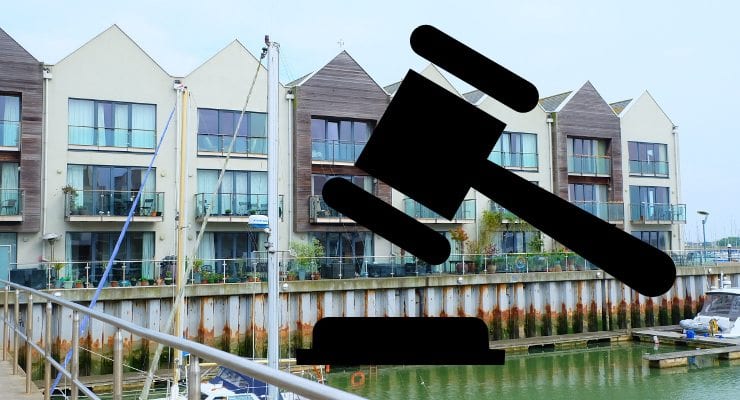Breaking Property News 03/02/25
February 3, 2025
Daily bite-sized proptech and property news in partnership with Proptech-X.
Labour’s housing crisis deepens as new builds decline
In the government’s first six months, the number of new homes built fell by 10%
BBC Verify analysis has revealed that the number of new homes built in England continued to decline in the first six months of Labour’s government. Data from energy performance certificates (EPCs), a key indicator of new housing, showed that just 107,000 new homes were recorded since last July’s election – a 10% drop compared to the same period in the previous year. Every region in England experienced a year-on-year decrease, with the North West seeing the steepest decline at over 27%. In light of this, David Hannah, Group Chairman of Cornerstone Tax, discusses why the government’s lack of joined-up thinking is continuing to increase the strain on the UK’s housing market.
Despite Labour’s ambitious pledge to deliver 1.5 million new homes by the next election, David states that this goal will be difficult to achieve, with the government’s finalised targets requiring councils to deliver 370,000 homes annually. At the same time, the UK has around one million unoccupied homes, including second homes and properties exempt from council tax, while long-term empty homes have risen by 16% since before the pandemic. Significant growth in new housing is not expected until 2026-27, once planning reforms take effect, but David warns that policy changes alone may not be enough. Further financial interventions will likely be needed to boost development, particularly in the social and private rental sectors.
The government has pledged to overhaul the planning system, reinstate mandatory housing targets, and invest £5 billion in housing this year, including an additional £500 million for the Affordable Homes Programme. However, with long lead times for planning approvals and construction, David remains cautious about whether these measures will be sufficient to deliver the scale of development Labour has promised.
David Hannah, Group Chairman of Cornerstone Tax, comments, “The decision from the government to lower stamp duty bands shows a concerning deficit of joined-up thinking. Does this Chancellor and Prime Minister not understand that if they want 1.5 million new homes, they cannot drive landlords out of the market, incur additional charges for first-time buyers and freeze up working capital for developers – which can only be available if these homes are selling. I expect stamp duty receipts to fall significantly, then to flatline in Q1 2025, potentially plunging the British property market into a desperate situation. In essence, reducing stamp duty thresholds means that it will ultimately be the consumers who foot the bill.
“Furthermore, it would make sense for the new Government to suspend, or even abolish, the 3% surcharge where properties are being acquired for private rental sector investment. Removing this measure would encourage landlords to increase their holdings, rather than exit the market – reversing the decline in the supply of rental homes and potentially expanding it to the point where demand no longer outstrips supply.”
Andrew Stanton Executive Editor – moving property and proptech forward. PropTech-X
You May Also Enjoy
0% mortgages – are they too good to be true?
With the reintroduction of 0% mortgages, are they too good to be true? A property expert weighs in This morning, Melton Building Society announced that they’re now offering 0% mortgages to customers. However, are these too good to be true? The deal is a five-year fix at 5.99 per cent with a £199 application fee,…
Read More Property Auctions: What Buyers and Sellers Need to Know Before Taking the Plunge
As more homes are bought and sold via auction, consumers are being urged to fully understand the process so they can gain maximum benefit, according to Stuart Collar-Brown, President of NAVA Propertymark (National Association of Valuers and Auctioneers). Property auctions continue to grow in popularity, offering buyers speed and transparency and providing sellers with greater…
Read More 5 Welfare Hire Providers to Consider for Your Next Housing Project
At a Glance Welfare facilities are essential on UK housing sites to meet compliance requirements and keep teams safe, comfortable, and productive. Choosing the right hire provider depends on unit type, capacity, sustainability features, site access, and service support. Here are 5 providers to shortlist from. Welfare Hire for Housing Projects On-site welfare facilities are…
Read More Mortgage market activity forecast to climb
The latest analysis from award-winning mortgage adviser, Alexander Hall, has revealed that mortgage market momentum has been building steadily over the last three years, with average monthly approvals for both house purchases and remortgaging increasing, and further growth forecast across the first half of the year. Alexander Hall analysed historic Bank of England data on…
Read More Highest number of homes listed for sale for a decade and falling mortgage rates signal good news for first time buyers
40% of homes are now cheaper to buy than rent – up from 25% a year ago February on track to record the highest number of newly listed homes for sale in a decade as confidence returns to the housing market There are currently 6% more homes for sale than a year ago – this…
Read More Property market momentum set to continue
The latest analysis from award-winning mortgage adviser, Alexander Hall, has revealed that mortgage market momentum has been building steadily over the last three years, with average monthly approvals for both house purchases and remortgaging increasing, and further growth forecast across the first half of the year. Alexander Hall analysed historic Bank of England data on…
Read More 








